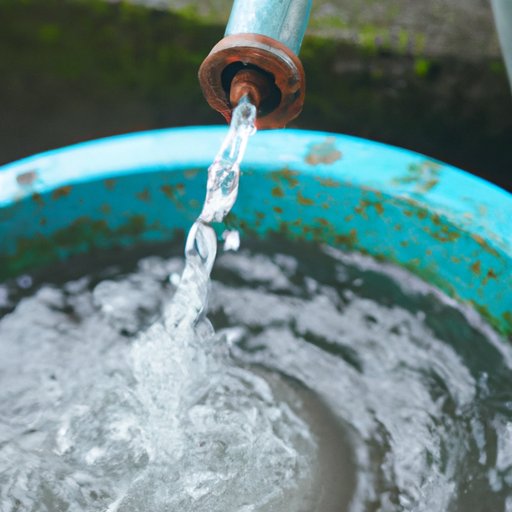Introduction
Well water is a popular choice for many homeowners because it provides them with a convenient source of potable water. However, before you make the switch to well water, it’s important to understand the difference between hard and soft well water and the advantages and disadvantages of each.
Definition of Hard and Soft Well Water
The hardness of water is determined by the amount of dissolved minerals, such as calcium, magnesium, and iron, present in it. Hard water has high mineral content, while soft water has low mineral content. The more minerals present in the water, the harder it is.
Overview of Pros and Cons of Both
Hard water has some benefits, such as providing essential minerals that are beneficial for human health. It also helps to protect pipes and other components of the plumbing system from corrosion and damage. On the other hand, hard water can leave behind residue on dishes, clothes, and surfaces, and can make soap less effective.
Soft water, on the other hand, does not cause buildup or residue and makes cleaning easier. However, it can be corrosive to plumbing systems and may contain fewer essential minerals.

Health Benefits of Well Water
Studies have shown that hard water contains essential minerals that can be beneficial for human health. According to a study conducted by the World Health Organization (WHO), “hard water can provide significant amounts of calcium and magnesium, which are essential for good health and development.”
Additionally, hard water has been linked to lower rates of cardiovascular disease, stroke, and other health problems. A study published in the American Journal of Epidemiology found that people who drank hard water were 14% less likely to die from heart disease than those who drank soft water.
Potential Health Risks
While hard water can provide essential minerals, it can also contain high levels of contaminants like lead, arsenic, and nitrates. These contaminants can be dangerous if consumed in large quantities. Therefore, it is important to have your well water tested for contaminants before drinking it.

Testing Your Well Water for Hardness or Softness
If you’re unsure about the hardness or softness of your well water, you can test it yourself using a simple DIY test kit or send a sample to a lab for professional testing. DIY test kits are available online or at hardware stores and typically involve combining a sample of your well water with a chemical reagent to determine the water’s hardness or softness.
Professional testing can provide more accurate results and is usually recommended if you suspect that your well water contains contaminants. Professional testing involves sending a sample of your well water to a lab where it will be tested for hardness or softness, as well as for contaminants.

Impact of Well Water on Home Plumbing Systems
The hardness or softness of your well water can have a significant impact on your home’s plumbing system. Hard water can cause build-up and clogging of pipes, while soft water can cause corrosion and damage to pipes.
If you have hard water, installing a water softener can help reduce build-up and clogging in your pipes. Water softeners work by removing calcium and magnesium from the water, making it softer and reducing the risk of clogs.
If you have soft water, you should install a water conditioner to help reduce corrosion and damage to your pipes. Water conditioners work by adding minerals back into the water, making it harder and reducing the risk of corrosion.
Environmental Impact of Well Water Use
Using well water can have a positive environmental impact. Because it is not treated with chemicals like chlorine, it is less likely to contaminate ground and surface waters. Additionally, using well water can reduce the strain on municipal water supplies, which can help conserve water.
It’s important to note that well water can still impact the environment if not managed properly. For example, if the well is not sealed correctly, it can allow contaminants to seep into groundwater, which can be hazardous to local ecosystems. Additionally, wells that are too deep can draw too much water from the ground, leading to decreased water levels and water shortages.
Conclusion
Understanding the differences between hard and soft well water, and the potential benefits and risks of each, can help you make an informed decision when it comes to choosing the best water for your home. Hard water can provide essential minerals and help protect plumbing systems, while soft water is less corrosive but may contain fewer minerals. Testing your well water for hardness or softness is important to ensure that your water is safe to drink and that it won’t damage your plumbing system. Additionally, using well water responsibly can help conserve water resources and prevent pollution.
(Note: Is this article not meeting your expectations? Do you have knowledge or insights to share? Unlock new opportunities and expand your reach by joining our authors team. Click Registration to join us and share your expertise with our readers.)
